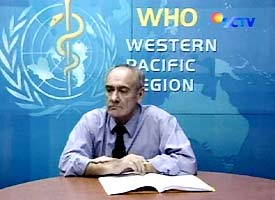Need to quickly kill bird flu in Southeast Asia

Peter Cordingley
European countries are now too frightened by the progress of bird flu but forget that the 'need' to kill this disease is still in Southeast Asia. Yesterday, Peter Cordingley, a spokesman for the World Health Organization (WHO), noted that this is also the area most likely to become the starting point of a human epidemic.
The WHO representative also hopes to receive more funding commitments from rich countries like Canada, Australia and Switzerland for Asia further in the coming weeks.
A senior veterinary officer from the World Organization, Alejandro Thiermann, also said that it is advisable to fight bird flu to the roots to save costs and be more effective.
Specifically, rich countries must help countries in Asia to drastically improve the health and veterinary sector, 'sweeping' the H5N1 virus in markets and animal farms, where there is a high risk of pandemic avian influenza. ability to appear.
' Training and awareness raising will take a long time, but if done correctly, Asia will no longer be a region to be concerned about the risk of a bird flu outbreak in the next ten years ' - Thiermann said. determined.
Meanwhile, Thailand said it is planning to test a vaccine on the human body in May 5-2006 and will set up a reserve right away if the vaccine is effective.
Earlier, Thailand has called on countries in the region to set up a mechanism to borrow drugs together to overcome the epidemic. The country now has a stockpile of about 725,000 doses of Tamiflu.
Roche meanwhile stated that it would shorten the production time of the drug (usually one year) by removing some stages and would send it to WHO 3 million boxes. It is reported that Indian company Cipla claims to make a Tamiflu-like drug to cope with the current shortage of drugs, although it is slightly less effective.
Currently, a group of EU experts has just arrived in Turkey to investigate the path of avian influenza virus, and a group of British experts also prepared to go to Southeast Asia to study how to control bird flu in the future.
MARINE PARTS ( According to AP, Reuters, AFP )
- Southeast Asia: Bird flu comes back
- Floods, droughts will attack Southeast Asia more rapidly
- Establishment of Southeast Asia bird flu center
- Southeast Asia is in danger of becoming a world outbreak
- Southeast Asia has a high rate of arsenic poisoning in the country
- Typhoon attacks on Southeast Asia are getting stronger
- Southeast Asia is vulnerable to hackers
- Southeast Asia should learn Chinese technology strategy
- Asia: 102 million USD for the fight against bird flu
- Discovered 160 new species in Southeast Asia
- Japan supports Southeast Asian countries against flood and storm
- Southeast Asia - 'hot spot' extinct
 March 2012: Launching H5N1 vaccine for poultry
March 2012: Launching H5N1 vaccine for poultry Experts comment on the mysterious gradual disappearance of the Delta variant in Japan
Experts comment on the mysterious gradual disappearance of the Delta variant in Japan Danger of the two Delta . branch variants
Danger of the two Delta . branch variants 2020 pandemic flu attack humans?
2020 pandemic flu attack humans?